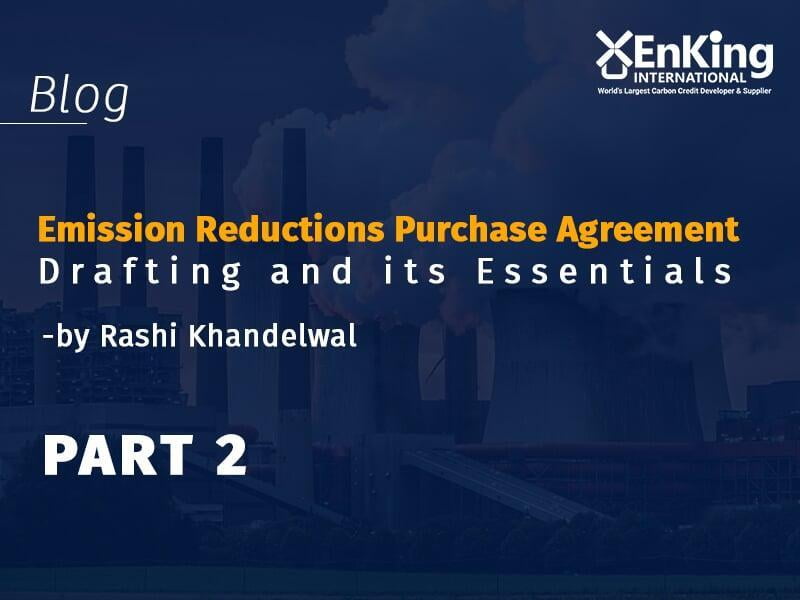DRAFTING OF ERPA-CONTENT INCLUSION
The following represents some clauses typically be included in an ERPA while drafting:
Parties and Contract Purposes
The commercial contract should clearly identify the parties to the contract and the full legal names of all the parties should be used in the signature line and elsewhere in the contract (not the trade names). This provision establishes the underlying provisions for the rest of the contract and usually includes a detailed description of the goods/services involved in the context of a purchase and sale transaction or in respect of a specific project.
Definitions
The use of defined terms can simplify a document immeasurably. While the number and extent of the definition section depends upon the nature of the agreement, virtually all contracts will include some defined terms.
Contract Price
The contract should clearly reflect the negotiated total payment details between buyer and seller (exporter). The following considerations may be taken into account in developing this clause:
-
Is the contract price clearly stated?
-
Is the price fixed or adjustable?
-
Is there a breakdown related to the components of the scope of the work to be contracted for?
-
Currency and basis of price – Is there one currency or are there multiple currencies?
Terms of Payment
The following considerations may be taken into account in developing this clause:
-
Does the contract clearly state how and when payment(s) will be made?
-
What is the credit period? Within 30 days of receipt of documentation? Immediately?
-
Are there partial payments due on milestones, e.g. final design, partial delivery, installation, and final acceptance? Are these due dates clear?
-
Are there any contract conditions “suspending” the payment obligation?
-
Is a specific documentation required to trigger a payment obligation?
-
Are approvals/acceptance required from the buyer in order to trigger payment obligations? (Is there a deemed approval/acceptance date?)
-
What are the mechanisms for payment? : Irrevocable Letter of Credit (ILC), open account, outside financing, bank transfer, etc.?
-
Does the contract provide for holdback payments?: If so, most holdbacks are payable after final acceptance by the buyer. Should the buyer never accept, the end result is that there may be no obligation for payment of that portion of the contract price. Without a “deemed approval” or “no later than” date, the exporter may have no legal recourse to the buyer under the terms of the contract.
Force Majeure Clause
The force majeure clause generally identify or lists events which the parties agree will cause excusable or justified delays in the performance of the buyer’s or seller’s obligations or excuse performance altogether. The following considerations may be taken into account in developing this clause:
-
Does the clause specify which events will constitute a force majeure?
-
What is the impact of a force majeure on the performance of the contract?
-
Will a force majeure suspend a party’s performance (and for how long) or excuse the party’s non-performance?
-
Does a force majeure result in an automatic extension of time for performance? What are the steps required to resolve the “excusable” delay?
-
What are the options available in the event of a force majeure? i.e. termination, delays, modification of scope?
Arbitration or Court Proceeding for Dispute Resolutions
The dispute resolution clause in a contract usually details the agreed procedures in settling any contract disputes. Dispute resolution through an arbitration process, which is typically subject to international law, where disputes can be settled by independent third parties, often preferable to resolution through the courts of the buyer’s country.
The following considerations may be taken into account when developing this clause:
-
What is the process for settling disputes or issues arising under the contract?
-
Does the contract specify governing law and a forum for dispute settlement?
-
If the contract contains an arbitration provision, are the rules, the location and the language of the arbitration specified? Can the arbitral decision be appealed to the courts? Who pays for the costs of the arbitration?
-
Does the contract allow time for the parties to seek an amicable resolution prior to initiating court or arbitral proceedings?
Contract Effectiveness
The contract effectiveness clause establishes the parameters under which the contract will come into force. There is sometimes a distinction in the contract between the date the contract was signed and the date of contract effectiveness. Contract effectiveness normally starts the “clock ticking” for all terms and conditions – delivery, payment, issuance of performance instruments, etc. The following considerations may be taken into account in developing this clause:
-
Does the contract come into effect upon the occurrence of certain events or upon signature by the parties or both?
-
If the contract is effective upon the occurrence of certain events, is the ultimate contract effectiveness date clear? If all of the events do not occur by a certain date, can the contract be terminated? Is there a deemed contract effectiveness date if the events do not occur within a certain period of time?
-
Are the contract effectiveness conditions acceptable?
-
Must the exporter start work prior to contract effectiveness?
Cancellation, Suspension, Termination and Settlement of Accounts
The following considerations may be taken into account in developing this clause:
-
Are the relevant contract termination provisions clearly stated?
-
Which party has a right to terminate?
-
Under what conditions can the termination right be exercised?
-
If the termination occurs, who owes what to whom?
The termination clause may also provide a process to settle differences. Payment and performance obligations should be outlined for each party upon termination of the contract.
Governing Law and Language
A governing law clause in a contract expresses the parties’ choice of legal system under which the provisions of the contract are to be interpreted. In the event of any dispute between the parties as to the meaning of the contract, it is intended that the specified governing law will be applied in interpreting the relevant provisions. In the absence of a governing law clause, the parties won’t know which laws may ultimately be invoked in construing or enforcing the contract.
Representations and Warranties
Representations and warranties identify the assumed facts underlying the agreement. These sections represent the real heart of the deal and tend to be heavily negotiated. An example would be a representation and warranty that the goods to be sold are in working order.
Indemnification
The indemnification portion of the contract deals with the allocation of liability in the event that all does not go as planned. Questions to be addressed in this portion of the contract include who will be liable for what, and to what extent.
Breach and Cure
Although promises are not necessarily made to be broken, that possibility must be considered when drafting a contract. What will constitute a breach of the agreement?
What opportunity will the parties have to “cure” the breach?
Remedies
The remedies section addresses the consequences in the event of termination. This section should specify what the parties are entitled to in the event of breach or termination. It may identify a dollar amount, a formula, or simply a mechanism for determining the appropriate remedy.
Additional Important Contract Provisions
A number of other standard provisions are important to include in drafting contracts. These include:
-
Assignment
-
Amendment and Waiver
-
Integration and Severability
-
Notice
-
Authority to Sign
CONCLUSION
While Contract drafting demands due diligence, there are a number of strongly held ideological values underlying contract law and its rules are motivated by conscious and deliberate public policy. Understanding these policy themes can help a practitioner appreciate the goals and assumptions underlying the legal rules involved in drafting Contracts.
One of the most important parts of drafting a contract is ensuring the language is clear and unambiguous. We should shun flowery words and legal jargon. In a nutshell, the Contract shall foster synergistic relationships among the parties, sustainably by imbibing the values that are inherent to our culture and this great Nation!
Disclaimer: The information provided in this article is the property of the individual author. The placement of this article is not meant as an endorsement/advertisement of the author for legal representation. The article is solely for the purpose of general awareness and public discussion purposes only.











